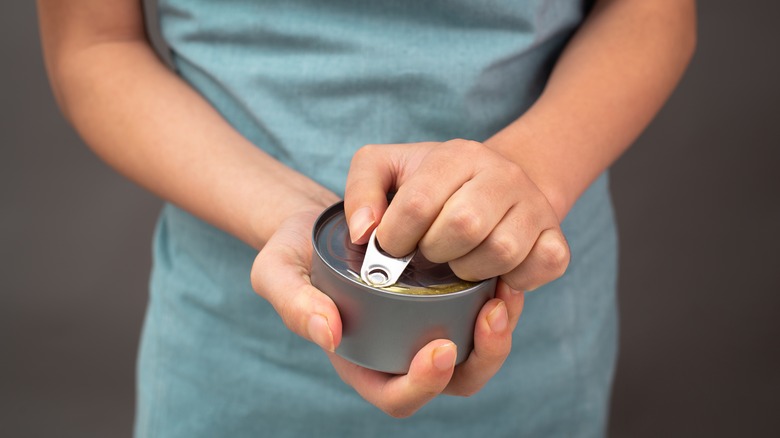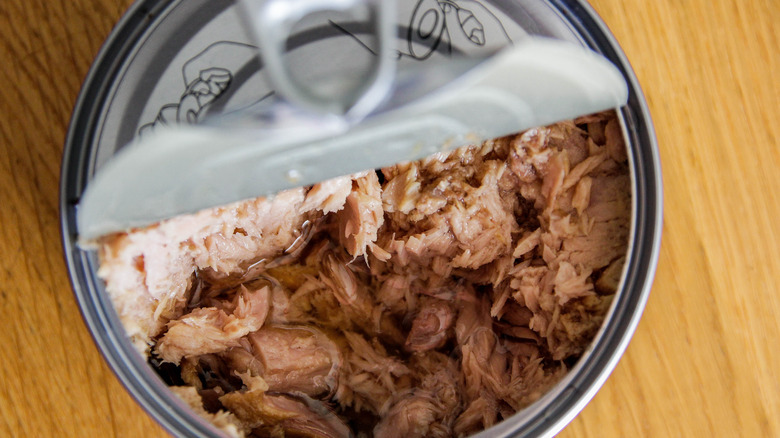When You Eat Canned Tuna, This Is What Happens To Your Blood Pressure
We may receive a commission on purchases made from links.
Your blood pressure is one of the markers of your cardiovascular health. For example, unmanaged high blood pressure can boost your chances of stroke or heart attack, and is a component of metabolic syndrome. It is also connected to kidney problems, dementia, cognitive concerns, and eye-related issues.
Speaking exclusively with Health Digest, board-certified family physician and best-selling author of "Eat for Life: The Breakthrough Nutrient-Rich Program for Longevity, Disease Reversal, and Sustained Weight Loss," Dr. Joel Fuhrman shared that we could reduce cardiovascular disease-related mortality by 30 to 40% if high blood pressure is eliminated. "High blood pressure puts a constant extra workload on the heart, increasing the risk of heart failure; high blood pressure can cause a small vessel in the brain to rupture, leading to a stroke, or cause an atherosclerotic plaque to rupture, leading to heart attack," the expert explains.
Consuming canned goods is one way in which we can inadvertently contribute to high blood pressure. Convenience, fast-paced lives, and sometimes even taste preference might lead you to pick up canned tuna off the shelf of a supermarket on your way home from work. But due to this go-to product's high sodium content, Dr. Fuhrman advises otherwise.
The sodium content in canned tuna is concerning
Sodium is one of the surprising things that can affect your blood pressure. As explained by Dr. Joel Fuhrman, a high-sodium diet can affect your heart by increasing your blood pressure and in other ways. Let's take a look at the blood pressure connection first.
"When there is an increase in sodium in the blood, water moves into the bloodstream, and pressure increases on the walls of the vessels," the author and family physician tells us exclusively. Your kidneys work by expelling sodium and water from your system and balancing blood pressure levels. However, chronic overconsumption of salt can mess with this. "Excess sodium intake impairs the function of water and salt-balancing hormones, and kidney function typically declines with age, especially when the kidneys' blood vessels are frequently exposed to high pressures," Dr. Fuhrman reveals.
Though there are low-sodium varieties of canned tuna available, regular canned tuna contains more than what the physician would recommend as a maximum serving of added sodium for a day, which is 300 milligrams. "Most canned tuna has more than that in a single serving," Dr. Fuhrman shares. In fact, canned goods, packaged goods, and even meals eaten at restaurants are more concerning when it comes to your daily salt intake. It's not really about how you season things at home, but there are some ways you can adjust your lifestyle to avoid excess sodium intake and, thereby, high blood pressure.
Tips to avoid excess sodium and high blood pressure
According to Dr. Joel Fuhrman, there are other things that happen to your body when you consume too much salt, like increased oxidative stress, arterial wall stiffening, impaired endothelial cell function (cells that line the inside of your blood vessels), weight gain, gastric cancer, and autoimmune disease. "The Global Burden of Disease Study, which tracks health data from 195 countries, estimated in 2019 that 3 million deaths per year worldwide were due to high sodium intake, more than any other dietary factor they studied," the physician tells Health Digest exclusively.
Opting to prepare your meals at home primarily instead of ordering take-out, eating frozen/canned meals, and eating out is one way to mitigate the problem of excess sodium consumption. When you do eat canned goods, read the labels and make sure you don't exceed your daily recommended limit.
However, the nutrition expert was quick to point out that fish itself can be a problem because of pollutants like microplastics and Polychlorinated Biphenyls, better known as PCBs. PCBs are synthetic organic chemicals, which at high concentrations could cause adverse health effects. "Predatory fish — like tuna or salmon — that are higher on the food chain tend to have higher levels of persistent organic pollutants like PCBs," Dr. Fuhrman explains. Through animal studies, PCB exposure has been linked to dermal toxicity, thyroid-related issues, and immunosuppression, among other concerns. As such, Dr. Fuhrman recommends avoiding fish and consuming algae-derived omega-3 supplements instead.


